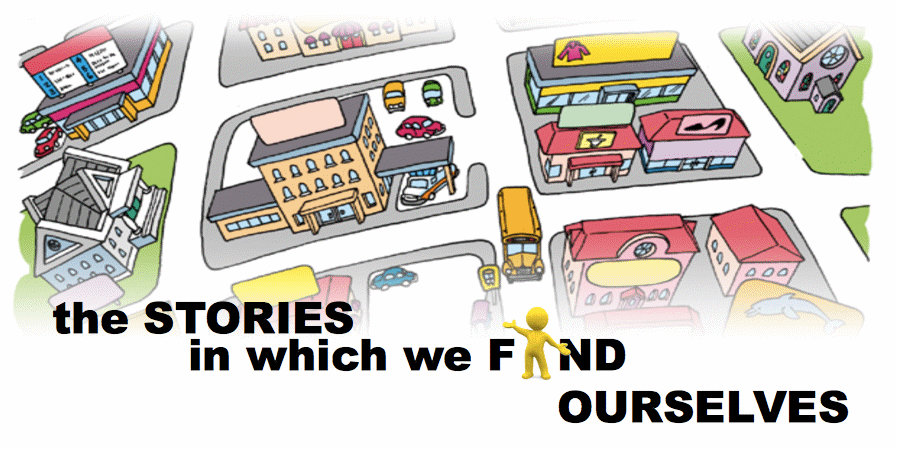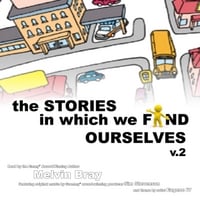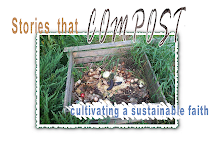A Series of Graciously Unfortunate Events—Episode 1
(from Genesis 3—a story of creation)![]()
Download a dramatic reading of "A Series of Graciously Unfortunate Event - Episode 1" complete with sound effects and musical score!
So even if we come of age and no longer insist that our early creation stories are scientific or historical accounts about specific individuals and particular incidents, they still remain quite useful in helping us find ourselves. In that regard, they are invaluable. Take for example the third story in the Genesis saga, the one about the man, the woman and the talking snake. I've never heard an animal talk and don't have to believe that they did at one time to imagine that a story about a talking snake has something important to say to me. Again, we don't have to make the Bible something that it's not to recognize its value.
With that in mind, it's okay to admit that the Bible doesn't provide many details about those early days of humanity. What details we do know, we know by literary excavation, corroborated by science. For instance, the description the Bible gives of a young humanity supports much of what archeologists tell us about ancient human society. In a valley such as Eden, our forebears would have been what anthropologists call hunter-gatherers, which is exactly how "the man" and "the woman" in the first three chapters of the Bible are indirectly described: "God said, 'See, I have given you every plant yielding seed that is upon the face of all the earth, and every tree with seed in its fruit; you shall have them for food.'" Eden is described as fertile and well supplied with fresh water, which would have offered suitable habitat for a wide variety of flora and fauna. Everything our ancestors needed for survival, education and enjoyment would have been readily available.
Scientists tell us that this birth of civilization likely occurred in the area of North Africa often referred to as the Fertile Crescent. This matches up nicely with the biblical description of Eden. In describing the great river that flowed out of Eden, the Bible names four tributaries or smaller rivers that branched off from it—Pishon, Gihon, Tigris and Euphrates—the last two of which still exist as a part of the Fertile Crescent today. What science isn't able to tell us, however, and what good science never tries to do is guess at the reasons for it all. That's where the stories from the Bible come in.
Exactly when or how long humanity called the valley of Eden home, the Hebrew storytellers don't say. What we do know is that there came a time that those living in the valley had to leave, and the leaving was a traumatic experience. It was so traumatic, in fact, that the only way the Hebrews could later describe it was in the most fantastic ways.
The story goes that one day "the woman"—she still doesn't have a name—was out and about by herself. Now lots of folks have tried to take issue with this over the years in telling this story, but I think its quite ridiculous and offensive to suggest that "the man" was too insecure to be left alone. Goodness! The woman deserved to be alone sometime. What was she supposed to do? Sit and hold the man's hand all day? If she never went off by herself, they would never have gotten any work done. And wasn't work part of why they were created?
Well, the woman was out and about, likely working, when she caught a glimpse of those two most unique trees in the center of the garden. By now she was pretty use to seeing them. They weren't hidden or unfamiliar, but every time she laid eyes on them, she couldn't help but rehearse the warning that God had given in naming them.
It's at this part of the story that we are traditionally introduced to the talking snake. He is usually depicted being in the forbidden tree, munching on a piece of fruit. But that doesn't have to be the case. He could have alighted on the branch of the tree next to where the woman was standing (since the snake was talking, we might as well make him fly). He may have even sidled up next to her as she stood aloof daydreaming. He could have even have been a familiar acquaintance with whom she was out on a stroll. Either way, most important is, of all the possible images, Hebrew storytellers chose a snake, invoking all the craftiness listeners would associate with it.
Abruptly the serpent speaks, "'Did God say, "You shall not eat from any tree in the garden"?'
"The woman said to the serpent, 'We may eat of the fruit of the trees in the garden; but God said, "You shall not eat of the fruit of the tree that is in the middle of the garden, nor shall you touch it, or you shall die."'
"But the serpent said to the woman, 'You will not die; for God knows that when you eat of it your eyes will be opened, and you will be like God, knowing good and evil.'"
So when the woman saw that the tree was good for food and good looking and that eating from it made good sense, she had some and gave some to her husband, who had joined her, and he ate.
That's it. Just a little back and forth, and… BAM! Yet another human does something stupid. Whether we call it abuse of the freedom they'd been given, taking liberties out of context, living below their dignity, disobedience or sin, it's plain stupid! Trying to get out of life what God had not put in it. Screwing up the the very goodness Elohim created by imagining they knew different.
Immediately their consciences got the best of them. The eyes of both the woman and the man were opened, and they saw themselves naked, vulnerable, exposed. Well that wasn't what they'd bargained for. Shame, distrust and fear set in. Isn't that how it always is after the fact. We know we were wrong, but instead of this knowledge changing us, we narcissistically assume it's everyone else who has changed towards us; perhaps that's one way eating from the tree of our stupidity makes us mortal after all.
In their newly found self-consciousness, the woman and the man "sewed fig leaves together and made loincloths for themselves."










No comments:
Post a Comment